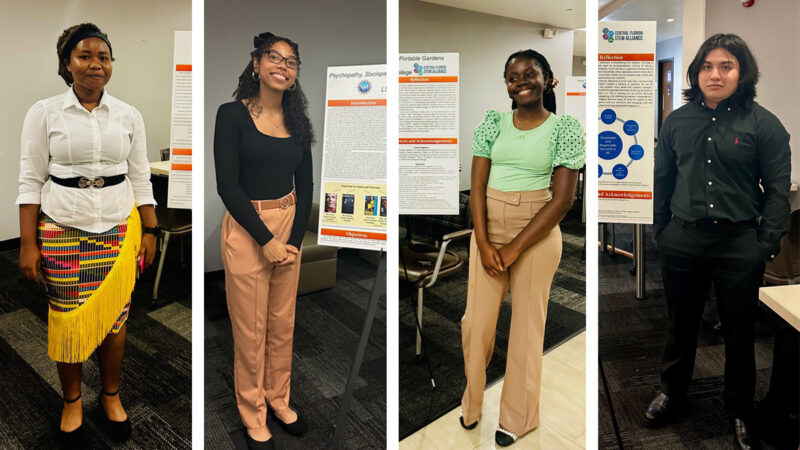Polk State LSAMP students show off research

Social disorders, artificial intelligence, and sleep were among the topics covered at this year’s Louis Stokes Alliances for Minority Participation (LSAMP) Showcase.
Four students had the opportunity to display their research in April on both the Lakeland and Winter Haven campuses. Fellow students, staff members, and faculty had a chance to observe the work, provide feedback, and ask questions.
“A lot of people were fascinated,” said student Moneska Metellus. “I’ve gotten a lot of positive feedback.”
The research
Mettellus conducted her research on food insecurity in Polk County. Through her research, she came up with cost-effective ways to grow food. A tower garden, she noted, can be created with milk jugs or pool noodles for as little as $20. Metellus said Cynthia Freitag, Professor of Biology, provided guidance with her research.
“I was always interested in community work,” she explained. “Growing up in Haiti, food insecurity affected many people. Through my research, I learned it doesn’t take a lot of money or resources to be able to fend for yourself.”
Alexandro Morales spent about two months researching the use of artificial intelligence in higher education. Rather than simply a tool for cheating, Morales concluded that AI has other uses that can be helpful.
“I talked about the pros and cons, but looked at ways that higher education can implement it,” he said. “A middle ground can be reached. It’s been talked about in art, music, movies – all kinds of industries. When I was researching the impact, I learned that a lot of people are using it as a tutoring system. People use it as a roadmap instead of just copying and pasting.”
Theresa Ackon, a second-year Polk State student, conducted research on two topics. The first was how sleep, or the lack thereof, affects female college students. Timothy Bradshaw, Professor of Biology, helped with her research. Ackon noted that quality of sleep was more important than length.
“Sleep is important for both genders, but females are biologically different,” she noted. “Females are more prone to have sleep difficulty. Bad sleep leads to lack of concentration and memory loss. Studying is important, but so is good sleep.”
Ackon also researched more effective ways to help Polk State students find their classrooms. With the help of Google maps, she was able to create a QR code that directs students to class. She said it could be developed into an app to help find each classroom on each campus.
“When I first came to campus, it was difficult finding classes,” Ackon recalled. “I was almost late and out of breath. Sometimes maps are difficult to read. I looked for a system for helping us find classes.”
Ariana Chapparo a recent Polk State Associate in Arts graduate, plans to attend Florida State University in the fall as a psychology major. She researched antisocial personality disorder and the similarities and differences between psychopathy and sociopathy.
“I want to show people how these disorders are dramatized in the media,” Chaparro explained. “Sometimes they’re portrayed incorrectly. They get these terms from the movies, particularly horror, and they’re often misused.”
For those with antisocial personality disorder, Chaparro noted that there are several factors that lead to the disorder.
“What was most interesting when I was doing my research was the biology behind it – genetics, a brain injury,” she added. “Antisocial personality disorder can have both biological and environmental origins.”
The feedback
On her display board, Chaparro used scenes from well-known movies and television shows such as Dexter, Sherlock, Psycho, and Halloween. This caught the attention of fellow students.
“A lot of people recognized the scenes and that started a conversation,” she said. “The feedback was interesting.”
Each of the four students enjoyed receiving feedback from their peers and College staff. Some students made new connections.
“I met the Dean of Academic Affairs (Bert Rivera-Marchand), and he shook my hand,” Ackon said. “That made me really happy.”
“A lot of people were fascinated by my research,” Metellus added. “I’ve gotten a lot of positive feedback.”
Student goals
LSAMP members have seen the value in the program that aimed to increase the number of STEM baccalaureate and graduate degrees awarded to underrepresented minorities and growing the number of minority individuals serving in STEM careers.
Chapparo spent just the Spring 2024 Semester as a member of LSAMP, but said the experience furthered her interest in psychology. She hopes to be a forensic psychologist, who works through the legal system by evaluating people on trial and assisting law enforcement.
Metellus moved from Haiti in 2013. With a passion for nutrition, she wants to ultimately become a doctor.
Set to graduate in December, Ackon also wants to become a doctor, but isn’t sure of a specific discipline yet. Like Chapparo, Morales has already received his Polk State Associate in Arts. He plans on majoring in computer science.
“I learned so much – not just reading and writing, but out in the community,” Chaparro concluded. “I made professional connections and learned about topics I otherwise might not have. The research program built my confidence in areas of interest and as a presenter. I was nervous at first, but after this project, I really felt confident in my research. There’s always room to learn more.”

